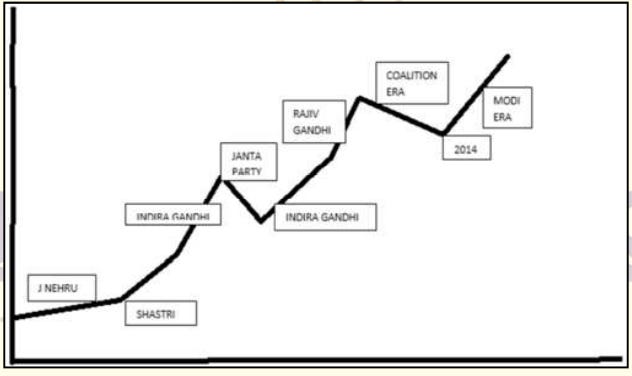
“Strong PMO is anti-thesis to the feature of collective responsibility of Council of Ministers”. Examine the issues in relation to the position of PMO vis-a-vis the Council of Ministers in the light of this statement. (2019 PYQ)"
the PMO is a non-constitutional body, it is often called the real government, because of the immense decision-making powers that it wields.
Effects of strong PMO:
It bypasses the constitutional body. As the Council of Ministers is the elected constitutional body, it should be responsible for the main decision-making.
Collective responsibility of CoM as required by the constitution is bypassed.
A pro-democracy is backed by debates and discussion which is bypassed by the strong PMO.
The concentration of power: In the hands of a few bureaucrats and people outside the executive which creates a Parallel government.
Checks and Balances: The scrutiny of the decision taken is not present. No checks and balances will exist since it is above all power structure.
The above graph represents the rising role of PMO in different PM’s eras.
But a strong PMO also has its own merits:
Assisting the prime minister in respect of his overall responsibilities as head of government like maintaining liaison with the council of ministers and state government.
Due to concern for efficiency and performance, many reforms are coming from PMO be it PRAGATI, Centralised Monitoring System, or 360-degree appraisals.
(POSDCORB of Gulick & Urwick)Faster decision-making by experienced and powerful decision-makers.
Security: Certain functions like RAW, CBI, ISRO, etc. report directly to them and they need to be kept out of the politics of the day.
Stable governance: In an era of a coalition government and numerous ordinances certain things needs to be kept above party politics to provide a stable government.
Specialists: Certain function needs specialists and also needs to be done away from public eyes for the greater good. Ex: Pokhran-II, External intelligence, etc
A centralizing and powerful PMO is a hindrance to collective responsibility and a democratic set-up of the executive but a weak PMO might lead to anarchy and policy paralysis and inefficiency. So it has to walk on a tight rope and exercise great restraint for maintaining the constitutional form of government.
Additional information
List of PMs of India and their secretaries
Jawaharlal Nehru -- A Jain as PMS (Prime Minister’s Secretariat-to provide procedural assistance)
Lal Bahadur Shastri -- L K Jha as PMS
Indira Gandhi -- L K Jha, P N Haskar & P N Dhar as PMS
Morarji Desai --- P N Dhar (PMS was renamed as PMO)
Indira Gandhi -- P C Alexander (PMO became stronger than cabinet secretary)
Rajiv Gandhi -- P C Alexander, Sarla Grewal & B G Deshmukh
Narasimha Rao ----A N Verma
Atal Bihari Vajpayee -- Brijesh Mishra
Manmohan Singh -- A Nair
Narendra Modi -- Nripendra Mishra
P.S.: Some points have been noted from the Lukmaan Ias model answers.



Some points which should be added:
-Initially created in 1947 under the name Prime Ministerial secretary (PMS) later in 1977 renamed as PMO.
-It got the status of department under Allocation of Business rules 1961.
-Administrative agency created under the provision of Article 77 (3) in order to provide secretarial assistance.
-PMO is an extra-constitutional body